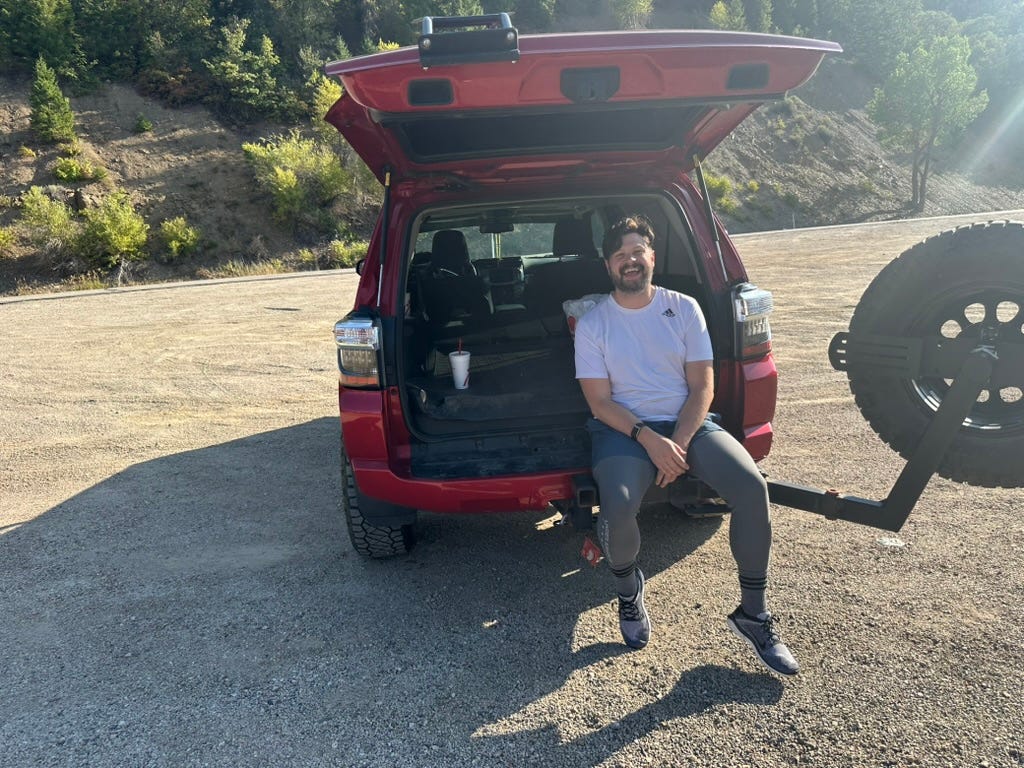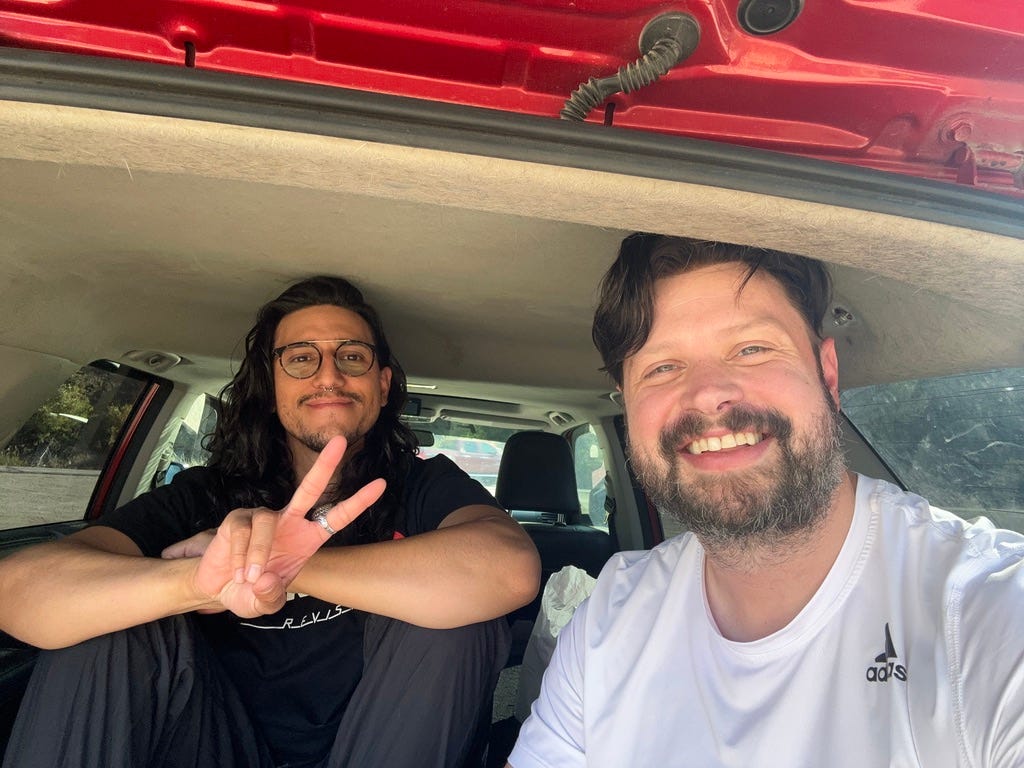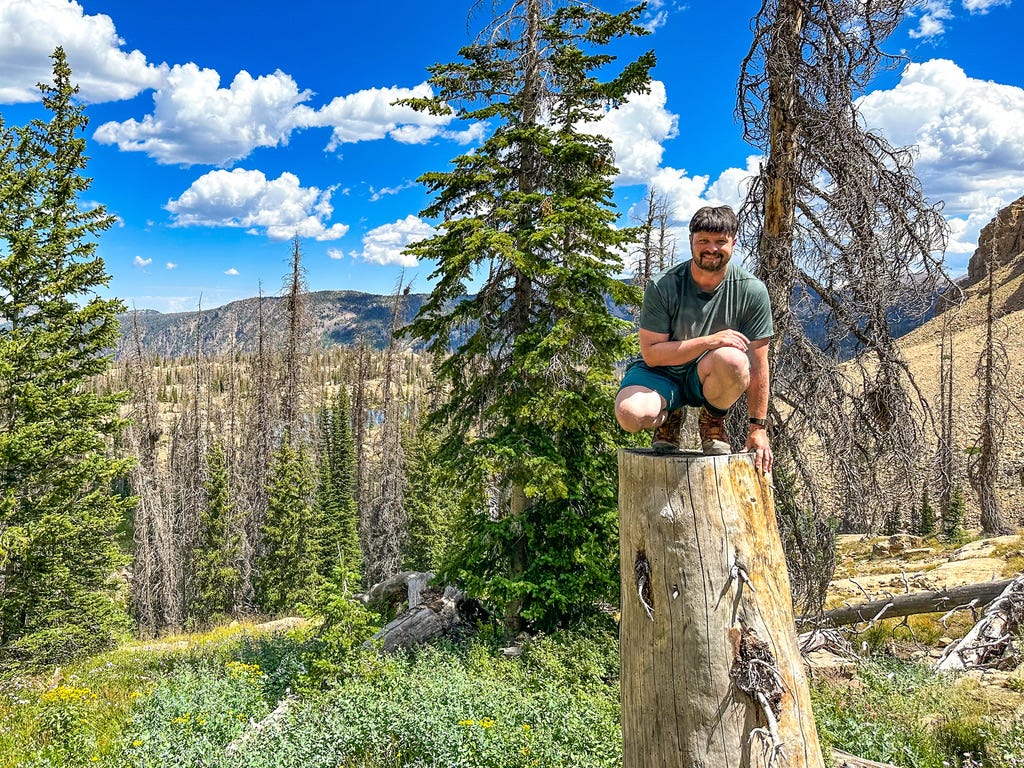We Were Supposed To Go Home For Dinner, Instead We Found Magic
Standing in a parking lot at 6 PM: the choice between efficiency and aliveness
We were supposed to be heading back to the house to make dinner.
Standing in the Lowe's parking lot at 6 PM on a Thursday, already later than planned, with nothing waiting at home and nothing thawed to cook quickly. The kind of minor schedule disruption that usually sends people into damage control mode: fast food drive-through, grocery store deli counter, the quickest path back to routine.
Instead, something different happened.
"Want to just drive somewhere and figure it out?"
The words came out before I'd calculated the logistics. No analysis of what was open or how far we'd have to drive. No weighing of efficient versus adventurous. Just an impulse that felt more true than sensible.
"Yeah, let's go."
And that's how a simple dinner disruption became a masterclass in following aliveness instead of managing it.
The Cascade of Small Yeses
Here's what I've been learning about spontaneity: it has its own momentum when you don't interrupt it.
We drove toward the canyon, no destination in mind, just following the pull of movement. Chick-fil-A appeared—not glamorous, not Instagram-worthy, just available. We ordered through the drive-through and kept driving.
"Want to find somewhere to eat this?"
Yes.
"Should we find a park?"
Yes.
"We're already close to the canyon road—want to drive up?"
Yes.
“How about lakeside?”
Yes.
Each small yes created space for the next possibility. Most people would have stopped at "quick dinner" and gone home to scroll their phones. But something was building—not a plan, but a momentum. An aliveness that had its own intelligence about what wanted to happen next.
By the time we pulled over at the lake, eating Chick-fil-A out of the back of a 4Runner while watching water lap against rocks, we'd followed a thread from routine disruption to something approaching magic.
This is what I mean about the momentum of yes: it doesn't wait for your permission to create meaning. It just moves, one small decision at a time, until you find yourself exactly where you didn't know you needed to be.
What We're Really Afraid Of
But here's what strikes me about this evening: how easily it could have died at any moment.
The impulse to "just drive somewhere" could have been met with "We should probably plan where we're going first." The suggestion to eat at the park could have triggered "But we don't have napkins," or "It's getting kind of late." The canyon road could have been dismissed with "We didn't really prepare for this" or "Maybe we should save it for another time."
Each moment offered a choice: follow the aliveness or apply the brakes.
We've been trained to apply the brakes.
To treat every impulse like a risk assessment, every spontaneous idea like a potential disaster waiting to happen. We interrupt our own momentum with logistics, with shoulds, with the endless need to optimize every decision.
But what are we really protecting ourselves from?
Not danger. The canyon wasn't threatening. The park wasn't unsafe. The Chick-fil-A wasn't going to bankrupt us.
We're protecting ourselves from the possibility that life might surprise us. That aliveness might lead us somewhere we didn't plan to go. That meaning might emerge without our careful management.
We've confused control with safety, planning with wisdom. But spontaneity isn't recklessness, it's responsiveness. It's trusting that your impulses might know something your mind hasn't figured out yet.
The Intelligence of Impulse
That Thursday evening taught me something about impulses I'd been getting wrong: they're not random.
The urge to drive somewhere carried information about what I needed… space, movement, a break from the contained energy of the day. The suggestion to eat by the lake wasn't arbitrary; it was my nervous system reporting that I craved beauty, openness, the specific aliveness that comes from being near water.
When we finally pulled over, the conversation deepened in ways it doesn't in restaurants or living rooms. Something about eating fast food while watching water move, about the informal intimacy of a tailgate, about being exactly where we hadn't planned to be, well, it created conditions for connection that couldn't be manufactured.
This is what the culture gets wrong about spontaneity. We treat it like chaos, like the opposite of intelligence.
But impulses carry information.
The urge to take a different route home, to call someone you haven't talked to in months, to dance in your kitchen while waiting for your coffee (I tell you, it IS magical)—these aren't random firing of neurons. They're your aliveness trying to get your attention.
The question isn't whether impulses are wise or foolish. The question is whether you trust them enough to find out what they're trying to tell you.
Performing Living vs. Living
Here's what I realized sitting by that lake, laughing at absolutely nothing while sharing waffle fries with someone willing to strap on to my Thursday evening impulses: most of us spend our lives performing living instead of actually living.
We schedule joy. We plan spontaneity. We optimize connection. We turn every moment into a project that needs to be managed, measured, and maximized for its potential value.
But the evening by the lake couldn't be optimized.
It emerged from a willingness to say yes without knowing where yes would lead. The meaning wasn't manufactured through careful planning. It arose from presence, from following the thread of aliveness as it revealed itself one decision at a time.
This is the difference between performing living and living: performed living requires outcomes, metrics, and Instagram-worthy moments that justify the time invested. Actual living just requires availability—to what's emerging, to what wants to happen, to the intelligence of impulses you didn't know you were having.
The impromptu photoshoot by the water's edge wasn't planned content creation. It was play. Laughter. Hilarity. Joy. Delight.
The deep conversation that emerged while watching the sun set wasn't a relationship milestone we were working toward. It was what happens when two people stop managing their interaction and start experiencing it.
The Sacred Ordinary
But here's what might be the most important part: none of it was “special.” And yet, all of it was.
Chick-fil-A isn't gourmet. Truck tailgates aren't romantic. Lake sounds and wind and ordinary conversation aren't the stuff of epic stories.
Yet the evening felt more alive than months of carefully planned, perfectly executed, optimally scheduled experiences.
This is what spontaneity teaches that planning can't: meaning doesn't come from perfect circumstances or ideal locations or flawless execution. It comes from presence. From showing up fully to whatever's actually happening instead of comparing it to what you think should be happening.
The sacred hides in the ordinary, but only when you're present enough to recognize it. Only when you're not so busy managing the moment that you miss the aliveness moving through it.
Sitting by that lake, eating fast food while the light faded, I understood something about joy I'd been getting wrong. Joy isn't an achievement. It's not something you earn through good planning or deserve through proper preparation. It's what happens when you stop interrupting your own aliveness with the need to control it.
The Muscle Memory of Following
Since that evening, I've reflected on how often I interrupted my aliveness. How frequently I’ve flinched, not because they're dangerous or unwise, but because they're unplanned.
The urge to call someone just because I miss them?
Postponed until I have a "better reason" that won't seem needy.
The impulse to take a different route home?
Dismissed in favor of efficiency.
The desire to dance to music playing in a coffee shop?
Killed before my shoulders can move because someone might notice.
Each time, there's this micro-moment where aliveness offers a possibility, and I choose management over momentum.
But I'm learning that following impulses is a skill, like any other. A muscle that needs strengthening. The more you practice saying yes to small spontaneous moments, the more available you become to larger ones. The more you trust your impulses with low-stakes decisions, the more you can trust them when higher stakes emerge.
The person who said "Yeah, let's go" to driving up the canyon hadn't suddenly become spontaneous that Thursday. They'd been practicing, yes, in smaller ways, building the muscle memory of following rather than forcing, of trusting rather than controlling.
Spontaneity isn't necessarily a personality trait that some people have and others don't.
Instead, it's a practice of staying open and available to what wants to emerge, and simply saying yes before your mind can list all the reasons why you should say no.
What Spontaneity Actually Is
Spontaneity isn't chaos. It's not carelessness or lack of planning or refusing to think things through.
Spontaneity is responsiveness. It's the willingness to follow the intelligence of the moment rather than forcing the moment to follow your predetermined plan.
It's saying yes to what's alive and available right now, instead of waiting for better circumstances or more preparation or ideal conditions that may never come.
It's trusting that your impulses might be carrying information about what you need—space, beauty, connection, play—that your mind hasn't consciously identified yet.
It's the practice of staying available to surprise, to possibility, to the aliveness that moves through ordinary Thursday evenings when you're not too busy managing them to notice.
Most of all, spontaneity is the recognition that life is happening right now. Not in the future when you've gotten your act together, not in the past when things were different, but in this moment when someone suggests driving up the canyon and you have the choice to say yes or apply the brakes.
The evening is still available. The lake is still there. The possibility of following impulses instead of interrupting them is always one yes away.
The only question is whether you trust yourself enough to stop performing your life and start living it.
Even when it leads to nothing more dramatic than fast food by a lake on a Thursday night.
Especially then.
If Life As I See It resonates with you and you think others might find value in it too, consider recommending this publication to your readers or sharing this piece with someone who needs to read it.
About Alex
I’m Alex Lovell — political psychologist, yoga therapist, and writer.
Lived homeless. Been divorced. Survived a seven-car pileup with a semi. Fell in love with questions that don’t have easy answers. I’ve met a lot of thresholds. Even the one before death.
These days, I split my time between research, writing, and holding space for people figuring out who they are after everything shifted.
This Substack is where I make sense of things out loud.
I write for people in transition — between roles, beliefs, relationships, selves.
The ones quietly wondering, “What now?” but allergic to one-size-fits-all answers.
Sometimes I quote research. Sometimes I quote my own nervous system.
One speaks in data, the other in sensation. I’ve stopped choosing sides.
Free subscribers get weekly articles and insights (sometimes twice a week!). Paid subscribers get the Thursday Offerings, seasonal companion pages, post-nidra audio, and live slow sessions. Join me?







If we over plan,
how will synchronicity
find and surprise us?
...
If we over prepare,
how will serendipity
catch, astonish us?
...
If we over think
how will spontaneity
delight us, school us?
... Can "sense of aliveness" replace synchronicity, serendipity, spontaneity in the verses above?
"meaning doesn't come from perfect circumstances or ideal locations or flawless execution. It comes from presence. "
Being present counts for a lot.